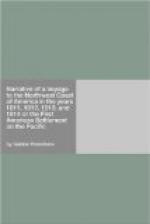We quitted Fort George (or Astoria, if you please) on Monday morning, the 4th of April, 1814, in ten canoes, five of which were of bark and five of cedar wood, carrying each seven men as crew, and two passengers, in all ninety persons, and all well armed. Messrs. J.G. M’Tavish, D. Stuart, J. Clarke, B. Pillet, W. Wallace, D. M’Gillis, D. M’Kenzie, &c., were of the party. Nothing remarkable occurred to us as far as the first falls, which we reached on the 10th. The portage was effected immediately, and we encamped on an island for the night. Our numbers had caused the greater part of the natives to take to flight, and those who remained in the villages showed the most pacific dispositions. They sold us four horses and thirty dogs, which were immediately slaughtered for food.
We resumed our route on the 11th, at an early hour. The wind was favorable, but blew with violence. Toward evening, the canoe in which Mr. M’Tavish was, in doubling a point of rock, was run under by its press of sail, and sunk. Happily the river was not deep at this place; no one was drowned; and we succeeded in saving all the goods. This accident compelled us to camp at an early hour.
On the 12th, we arrived at a rapid called the Dalles: this is a channel cut by nature through the rocks, which are here almost perpendicular: the channel is from 150 to 300 feet wide, and about two miles long. The whole body of the river rushes through it, with great violence, and renders navigation impracticable. The portage occupied us till dusk. Although we had not seen a single Indian in the course of the day, we kept sentinels on duty all night: for it was here that Messrs. Stuart and Reed were attacked by the natives.
On the 13th, we made two more portages, and met Indians, of whom we purchased horses and wood. We camped early on a sandy plain, where we passed a bad night; the wind, which blew violently, raised clouds of sand, which incommoded us greatly, and spoiled every mouthful of food we took.
On the 14th and 15th, we passed what are called the Great Plains of the Columbia. From the top of the first rapid to this point, the aspect of the country becomes more and more triste and disagreeable; one meets at first nothing but bare hills, which scarcely offer a few isolated pines, at a great distance from each other; after that, the earth, stripped of verdure, does not afford you the sight of a single shrub; the little grass which grows in that arid soil, appears burnt by the rigor of the climate. The natives who frequent the banks of the river, for the salmon fishery, have no other wood but that which they take floating down. We passed several rapids, and a small stream called Utalah, which flows from the southeast.




